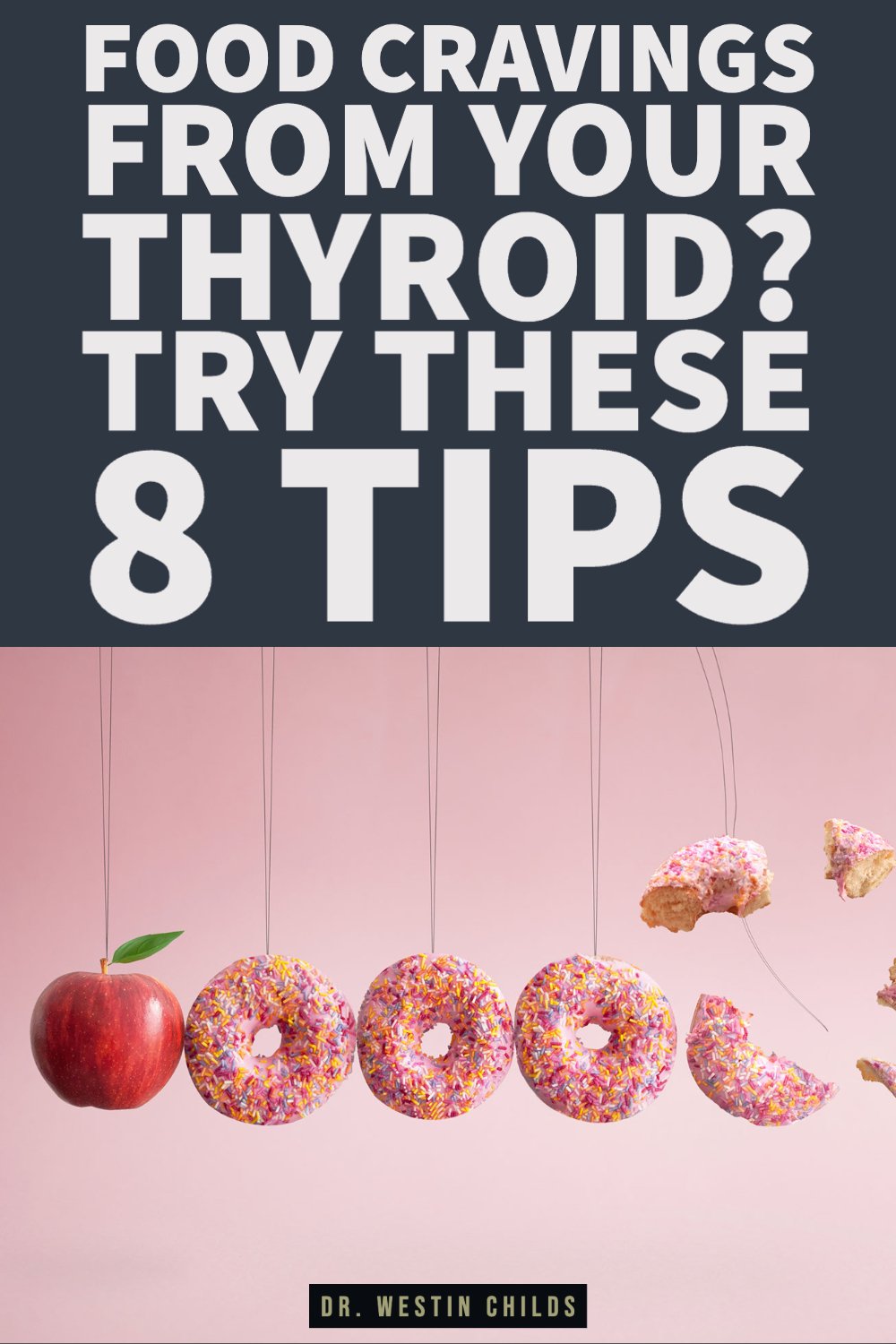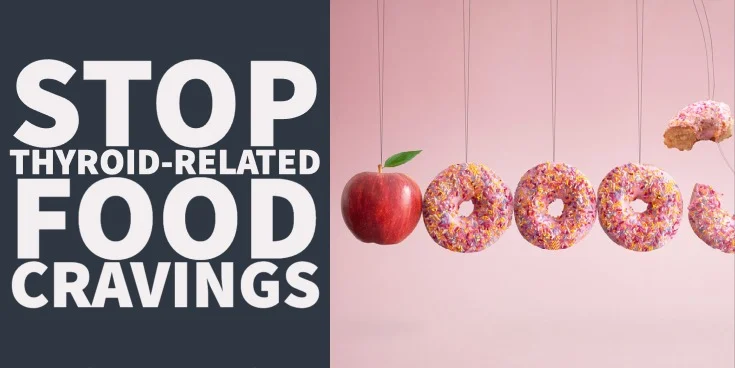Struggling to keep your appetite under control?
It’s not in your head, it’s probably related to your thyroid.
It’s very common for thyroid patients to experience dysregulated hunger cues (1) causing them to eat more than they should and to gain weight.
These hunger cues stem from the impact that thyroid hormones have on different hormones and systems in the body.
The good news is, you can actually take control of these cues and get both your appetite and metabolism under control.
We’ll talk about how to do that in just a second but, before we do, let’s have a quick discussion on the different types of hunger that you may experience.
You need to understand these because each one is treated differently.
Hunger usually stems from one or more of the following reasons:
- An empty stomach: This type of hunger occurs first and it occurs when your stomach is empty. It also tends to be weaker than the other signals we will discuss.
- Metabolic demand: This is true hunger and it stems from the need your body has for nutrients to function. This type of hunger can be very strong.
- Psychological needs: This is a false sense of hunger that does NOT stem from a need for nutrition. It’s triggered by emotions, the environment you’re in, stress, habits, and so on.
- Mismanaged hunger signals from hormone imbalances: The hormones responsible for controlling your appetite include leptin, ghrelin, and peptide yy.
Your thyroid can influence each one of these and its influence can be different for each person.
This means managing your hunger cues will require you to do a little digging to figure out which issue you are dealing with.
It’s not as hard as it seems and here are some tips to help you figure it out.
Let’s start with some of the basics. These are things that everyone should be doing:
DOWNLOAD FREE RESOURCES
Foods to Avoid if you Have Thyroid Problems:
I’ve found that these 10 foods cause the most problems for thyroid patients. Learn which foods you should avoid if you have thyroid disease of any type.
The Complete List of Thyroid Lab tests:
The list includes optimal ranges, normal ranges, and the complete list of tests you need to diagnose and manage thyroid disease correctly!
#1. Make sure you are drinking enough water.
I put this as number one because it’s so obvious and yet so many people miss it.
In fact, as many as 30% of people confuse the sensation of thirst with the sensation of hunger (2).
In other words, people believe they are hungry when they are actually thirsty.
The reason for this is that the same part of your brain that regulates appetite also regulates thirst and the signals between both can be fairly weak.
Your brain can get further confused when you throw zero-calorie sweetened drinks into the mix.
Your brain senses sweetness but there are no calories.
The solution to this problem is simple:
Simply drink water when you feel you are hungry and wait 20-30 minutes.
If your hunger is real, then it won’t subside.
If you are just thirsty, the problem will be solved.
#2. Make sure you are eating enough protein.
The next thing you want to do is ensure you are eating enough protein throughout the day.
Protein is an incredibly satiating macromolecule, more so than fat or carbohydrates.
This is because it has a greater stimulating effect on appetite-suppressing hormones like GLP-1, cholecystokinin, and peptide yy (3).
On top of that, protein is necessary to build and maintain healthy muscle mass.
Because of the connection between thyroid function and muscle mass, you never want to skimp on protein.
More muscle mass will mean better thyroid function which will mean better appetite and metabolism control from the influence of thyroid hormones.
You should be getting around 60 grams of animal protein each day or 100 grams of plant-based protein each day (or some combination).
Plant protein is not as well absorbed as animal protein and it has a different amino acid composition meaning you will need more of it to get the benefits on muscle mass.
#3. Make sure you’re actually hungry and not eating as a response to your emotions.
This is more common than you might realize and it’s tied to the connection between your brain and emotions and thyroid in a pretty complicated web.
In a nutshell, here’s how it works:
The sensation of hunger leads to negative emotions (4).
Negative emotions include things like anger, sadness, loneliness, jealousy, fear, and so on.
This, by the way, is why some people get “hangry” when they are hungry.
These negative emotions are problematic because they increase your risk of overeating or undereating.
The more you overeat or undereat, the more likely you are to experience negative emotions and the cycle continues.
Your thyroid gets involved because thyroid dysfunction can cause mood swings, depression, anxiety, and weight gain.
The less control you have over your thyroid, the more likely you are to experience negative emotions, and the more likely you are to not have control over your appetite.
If you are hungry, pay attention to your emotions.
Are negative emotions influencing your hunger cues? Is it related to your mood? Is it related to your environment? Are you just eating because everyone else is?
If so, your emotions are hijacking your hunger cues and taking over.
#4. Still hungry after a meal? Fill up on vegetables.
You can easily control your appetite by filling your stomach with foods that are healthy, nutritious, low in calories, and high in nutrients.
Green leafy vegetables fit the bill.
These fiber-rich foods contain compounds that are slowly digested, support your gut health, and exert an influence on gut-related appetite-controlling hormones.
You can eat a high volume of these foods which also triggers stretch receptors in your stomach sending signals to your brain (5) that you are truly full.

On top of all of this, they are also low in calories which means you do not have to worry about overeating.
You’re never going to run into problems by topping off a meal with extra steamed broccoli or cauliflower.
But doing this will absolutely eliminate your hunger cues and make you healthier in the process.
These 4 tips are really just the basics, but you can get into more advanced methods of controlling your appetite which we will talk about right now.
More Advanced Ways To Control Your Appetite:
#5. Optimize your thyroid.
No matter what, you must do this step.
If your thyroid is responsible for your hunger and food cravings, optimizing thyroid function will be necessary to ultimately control this problem.
For most people, this means getting a complete thyroid evaluation and using thyroid medication if necessary.
To test your thyroid, you will need more than just the TSH, and you can see a list of all of the lab tests necessary here.
If you are someone who is already taking thyroid medication and still experiencing issues related to your hunger then you will probably need to further optimize your dose.
This is not uncommon, by the way, as many thyroid patients taking thyroid medication are actively being underdosed or taking the wrong combination of thyroid hormones.
Getting a comprehensive thyroid lab panel will help you figure out if changes to your thyroid medication are necessary.
You can also do a lot to improve your thyroid in an all-natural way.
Using thyroid support supplements, diet, and making changes to your lifestyle can all help improve and balance thyroid function in your body.
It doesn’t matter how you do it, just make sure that you optimize thyroid function.
#6. Check your leptin level.
Leptin is a hormone secreted by your fat cells that travels to your brain and is meant to suppress hunger.
This is what is supposed to happen when everything is working as intended.
Unfortunately, thyroid dysfunction causes problems with leptin signaling leading to a condition known as leptin resistance.
If you are leptin resistant, your brain will fail to get the signal from your fat cells and instead of suppressing your appetite, it will increase it (6).
In this way, your thyroid influences appetite through its influence on leptin.
And this form of hunger can be very difficult to treat because it stems from mismanaged hunger signals.
You can easily identify if leptin is the problem by getting a fasted serum leptin lab test.
If your fasted serum leptin level is elevated when tested, AND you are overweight, AND you are unable to lose weight, then the diagnosis of leptin resistance can be made.
The treatment for leptin resistance is to re-sensitize your body and brain to the hormone leptin.
Doing this will then allow leptin to do its job and you will no longer have mismatched hunger cues from this hormone imbalance.
Treating leptin resistance will require that you optimize your thyroid, by the way, so make sure you do that in combination with treatments that are specific to leptin resistance.
#7. Try natural appetite suppressants.
If you are having issues controlling your hunger and it’s not clear where it’s coming from, you can always lean on natural supplements to help as well.
These natural supplements can be very powerful when used correctly and they each work in a different way.
Here are some of my favorites:
- The amino acid L-glutamine: 2-5 grams each day can suppress your appetite (7) and have a positive impact on gut health.
- The viscous fiber glucomannan: Glucomannan expands when taken with water which triggers receptors in the stomach. It’s great to use before a meal or throughout the day when you are hungry.
- 5 HTP: 5 HTP is a serotonin precursor that can help suppress appetite at the level of the brain (8).
- Berberine: Berberine is a plant alkaloid often used to help with weight loss but some people report that it does also curb appetite as well.
#8. If all else fails, consider prescription appetite suppressants.
You have to be careful with this option because prescription medications do not come without side effects.
Yes, they do work, but you have to weigh the pros and the cons to see if they are worth it for your situation.
I’m not a huge fan of them due to their side effects, and the fact that natural options are very effective, but there are situations where they can be considered.
Some of the most popular prescription appetite suppressants include:
- Pretty much any stimulant or ADD medication like Phentermine or Adderall: Again, these aren’t ideal for long-term use but they may be helpful for short periods. You have to watch out for issues relating to insomnia, blood pressure, and heart palpitations when using these medications.
- GLP-1 agonists: This would include very popular weight loss medications like semaglutide and Wegovy. These medications may increase your risk of thyroid cancer and cause muscle loss, so be cautious when using them.
- Naltrexone: Low doses of naltrexone in the range of 4.5 to 13.5mg can help suppress appetite and may help reset the body’s set point.
You can consider these options but I would always recommend trying natural options first and only using them as a last resort.
Unfortunately, issues with appetite tend to come hand in hand with weight gain.
If you are someone who has been struggling to lose weight and you believe it’s related to your thyroid, then I’d recommend checking out this article next.
It walks you through how to lose weight with hypothyroidism in a step-by-step way.
Now I want to hear from you:
Do you feel that your thyroid is impacting your appetite?
Have you tried getting control over your appetite through any of the recommendations listed here?
If so, which ones have you tried? Did they work for you?
Leave your questions or comments below!
Scientific References
#1. pubmed.ncbi.nlm.nih.gov/15994748/
#2. ncbi.nlm.nih.gov/pmc/articles/PMC2467458/
#3. ncbi.nlm.nih.gov/pmc/articles/PMC7539343/
#4. pubmed.ncbi.nlm.nih.gov/34637770/
#5. ncbi.nlm.nih.gov/pmc/articles/PMC3582731/
#6. ncbi.nlm.nih.gov/pmc/articles/PMC6893721/
#7. ncbi.nlm.nih.gov/pmc/articles/PMC7517657/
#8. ncbi.nlm.nih.gov/pmc/articles/PMC5256178/










Hi Dr Childs!
It’s a long comment, but there is 2 questions at the bottom 😉
I’m 54 yrs old, born in “69. For at least the last 30 years, I have been told regularly how dehydrated I am. Back then, I wasn’t taking any medication. The comment would come from the optometrist (dry eyes), the gynaecologist (dry vagina), the dentist (dry mouth), the ENT (dry skin in my ears that become very itchy), the chiropractor (discs degneration for the last 5 years, sciatic nerve problem) and everyone in the beauty business (hair, skin, nails) for as long as I can remember.
I also have joint problem mainly over my hips, my spine and my hands with arthritis AND arthroses. I use to have repetitive bursitis and tendinitis on my both shoulders and elbows, but the vitamines (listed below) made a huge difference.
Also, I drink at least 1.5 liter of clear water (and a little of sparkling water) over the day, more if needed (like training). I still have a dry mouth and feel thirsty and all the above dryness examples keep going. My water consumption always been important as I don’t drink anything else like coffee, tea, juices, milk or alcool. I did consume diet cola from the age of 16 and believing the media saying was “healthier” than regular cola… Now, I know better! I was so addicted. Diet cola is terrible for inflammation! I stopped drinking Diet Cola by myself about 7 times for 6 months or so. I finally was able to stopped drinking by having only one appointement with an hypnotherapist. I haven’t touch a cola for the last 15 years… and it was effortless this time.
I have been taking synthroid from 2007 to 2022 and Erfa Thyroid since sept 2022; CBD oil and Cesamet / nabilone since 2021 for fybromyalgia & severe migraines; multiple vitamines such magnesium, omega 3, probiotics, D3/K2, L-glutamine, psyllium, vitamin C and Zinc for about 6 years; concerta for AD since 2014; gluten free diet since 2009 (Cealiac) and hormonothérapie for the last 10 years (menopause at age 42 / my mom was at 55). I’m not totally happy with my Erfa thyroid treatment but, however, I feel way better than with the Syntroid… and I’m actively looking to find a doctor to help me.
Your website has been the most powerful tool to help me understand and manage my hypothyroidism. Thank you 🙂
My questions are: is thyroid problem can cause such overall dryness? Is thyroid problem can cause an early menopause? Or is it from Cealiac disease?
Hello, check out the carnivore diet. Lots of info on youtube; Dr Berry, Dr Sean Baker, Dr Chaffee, Dr Paul Mason, Dr Rob Cyves to mention a few. This diet has helped me and my wife tremendously with everything from jointpain to depression. We are 57 and 54, no medications whatsoever. All the best from Norway
Hi Knut,
Carnivore can be therapeutic for some, but for most, I don’t recommend it long-term for the reasons listed here: https://www.restartmed.com/carnivore-diet-for-hashimotos/
What if you are lactose intolerant and have celiac disease along with hypothyroidism?
Hi Jean,
Is your question in regards to how those conditions impact food cravings or just in general?
What brand of L-glutamine do you recommend?
Thank you!
Hi Molly,
For appetite control, I’d pair it with glucomannan like in this product: https://www.restartmed.com/product/glucoslow-fiber/
If you are just using l-glutamine alone then find a reputable brand that third-party tests their ingredients.
Are you saying that hypothyroidism can cause this insatiable hunger? I ask because there doesn’t seem to be a whole lot of people talking about it. I hear a lot about hyperthyroidism causing excessive hunger.
Hi Olivia,
Thyroid disease can certainly impact appetite but there are many other things that can as well.
How do you re-sensitize Leptin?
Hi Ashley,
There are several therapies that can help including supplements, eating enough calories, thyroid hormones like T3, and some medications like GLP-1 agonists. I see the best results when multiple treatments are used at once.